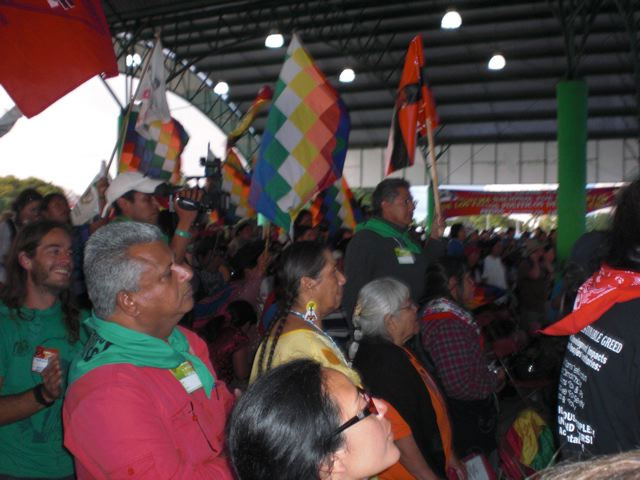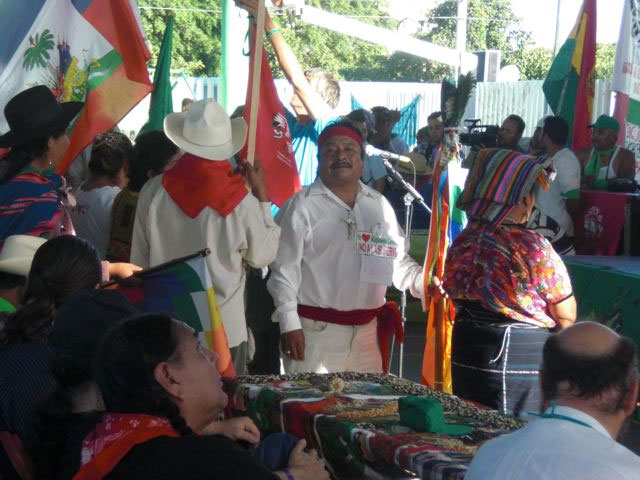Report #3
December 30, 2010
By David Simpson and Jane Lapiner
Cancún’s Question: Is Climate Change an Issue for “Social Movements” or Just Another Business Proposition?
Click on photos for larger images
In seeking opinion to help determine the relative success or failure of the UN climate change conference in Cancún this year, it is impossible not to notice how little coverage of any kind the major news media in the United States committed to the event before, during or after its conclusion. Only the overtly progressive Democracy Now gave anywhere near the same level of attention that it had in Copenhagen. Comparison to the vast hype and hoopla surrounding last year’s event is inevitable. Given the deeply disappointing result in Denmark, the fall off of coverage should come as no surprise. It is the extent of that fall off that is a little shocking. After all, climate change by most estimates remains the gravest threat to face humankind ever.
At this rate of diminishment, though, annual events organized by the convening agency, the United Nations Framework Convention on Climate Change (UNFCCC), will soon have all the social relevance of a plumbing and wiring convention which, in some ways, it already is: the display of new professional energy-saving processes and products in the outer halls lends to these events the air of a trade show. The prodigious representation there of large commercial interests and governments supporting those interests reinforces the trade show concept.
But these are not trade shows. They are not simply marketplaces for new technologies or new concepts. Even if such technologies actually promised relief, the disadvantage that developing nations and their citizens endure (as well as poorer people in wealthy nations) are systematically related to the root causes of climate change. They create factors of glaring inequity with which the private sector has never been capable of dealing successfully. The ardent proponents of technological fixes seem always to presume that these new solutions will suddenly be distributed fairly and with compassion, an eventuality that almost any reading of history belies.
All these things being equal, if you perceive that climate change is a slowly gathering menace that might begin to hurt us sometime in the mid-future and that for now all we need to do is take a few smaller, careful steps—nothing that would impact negatively on our economy—then you might think that what was accomplished at Cancún was adequate.
If on the other hand you saw climate change as a fast-growing phenomenon that has already done major damage to natural systems and social structures and that we are potentially approaching tipping points from which there is no backtracking, then you might wonder—Do these people know something we don’t? Do they have personal insulation adequate to protect themselves from the fury of a climate gone awry? Do they have a special deal with some God or other? What’s wrong with these people?
Cancún was a repressive venue in several regards. It was chosen over Mexico City for reasons of defensibility. From the start, events and circumstances were organized as best as possible to allow for the outcome that finally emerged and to cut off almost all potential avenues of protest or effective disagreement. In the end, courageous Bolivia, was the last holdout. Its representative was gaveled down by the COP President, the hard-joweled Patricia Espinosa, by virtue of a revamped idea of what constituted consensus.
Late Friday night, a group of us sat at a faux-Indian restaurant midway along the vast hotel row at the southeast edge of Cancún while a friend, the head of a large university-based climate change institute, fielded tweets on his cell from the Moon Palace, scene of the closing deliberations, Periodically he erupted in pained anger. “Screw you, Turkey!” “As..ole France!” “Piece of S..t Ethiopia!” “F..k you Japan!” As one after another congratulatory statement of acceptance of the new deal was read into the UNFCCC minutes.
It was clear now. The fix really had been in. It could be seen in the grim, tight-lipped repressiveness of the UN’s own security people as they responded to the relatively miniscule challenges that were mounted more or less spontaneously inside the event. It was visible at the desk where press accreditation was granted. Only 2,000 were given press passes as opposed to 6,000 in Copenhagen,
They weren’t going to let this one get out of hand. No way. Not like it got in Copenhagen. They hadn’t moved this conference from Mexico City to Cancún just to see it get lighted up by real protest here in the heart of the tourist juggernaut.
The mildly cadaverous, ageing Ivy Leaguer, Todd Stern, chief climate envoy for the US, and his crew had not worked for nothing for so long to make sure no piss-ant little group of Alba or African or Small Island Nations was going to ruin their efforts again to do business in the name of climate change. The US hadn’t been twisting arms for nothing for a full year to avoid a repeat of what had happened in Copenhagen when a handful of nations had been able to swat down the Accord. This potential route, previously undiscovered, around the threat of additional binding emissions commitments and opened, ironically by Kyoto’s single non-signatory, was too attractive for the United States to summarily abandon.
The Party’s (nations) roll call of surrender was rivaled in obsequiousness and cheery capitulation by that of what seemed a majority of ex-official NGO, Press, and commercial commentators. If there was a saving grace, it was the occasional caveat amid the veritable ululations of support suggesting that there was still a long way to go.
A very long way. Were we to take as the basis for our working template only the level of emissions reductions indicated in the Copenhagen Accord—and now in the Cancún Agreements—world average temperatures would likely rise between 3.2 and 5.4 degrees centigrade by the end of the century. Given that the rise to date of .8 degrees C since 1870 has already produced changes of a considerable magnitude—glaciers disappearing, ocean acidifying, permafrost melting, sea level rising, unprecedented heat waves, massive flooding, 300,000 deaths by climate this year alone—the thought of enduring temperature rises 4 to 6 times greater is terrifying.
Do I personally believe that we are condemned to this eventuality because of a refusal to step outside the insulated dome in which business likes to play? Maybe. There is an inveterate, deep-seated cautiousness that surrounds large-scale business and societal investment. Also, society’s long-term normative responses— what’s seen as right, what’s wrong, what’s dumb, what might work—are strongly resistant to change—or change at the rate that climatic circumstances might demand.
We are now in uncharted territory and as normative responses migrate rapidly and caution is seen as incaution in disguise, there will be a shift. It is at this fault line where a substantial realignment is possible. Leverage must be applied. Only what has come to be called “civil society” or the “social movements” are positioned to provide this pressure.
This is because these agencies and their practitioners are proxies for alliances and social groupings that are both more local and more universal at the same time—the people of the world themselves, whose stake in this is their very lives. Many have been unable, due to accidents of birth or lack of time or resources, to mount effective action in the name of their own and the planet’s survival, but humanity begins now to awaken and take stock. Let the battle for credibility begin!
Previous: Cancun (COP16) Report 2




Thanks for sharing. I read many of your blog posts, cool, your blog is very good.
Can you be more specific about the content of your article? After reading it, I still have some doubts. Hope you can help me.